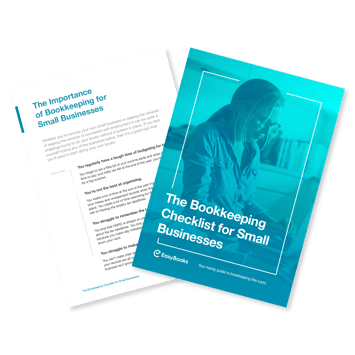For the majority of small business owners and the self-employed, bookkeeping isn’t at the top of their list. It can be tedious and time-consuming, but that doesn’t mean it should be brushed aside.
Avoid these costly mistakes when it comes to bookkeeping to ensure all your financial records and returns are in order:
- Outsourcing Your Bookkeeping
- Not Chasing Late Payments
- Failing to Keep Relevant Receipts
- Carelessness When Bookkeeping
- Combining Business And Personal Expenses
- Using Manual Accounting Systems
1. Outsourcing Your Bookkeeping
Whether you're self-employed or a small business owner, you'll usually have to wear many hats and wear them well. You work hard for your money and the last thing you want is to give one chunk to the taxman and another to your bookkeeper. Plus, if you outsource your business bookkeeping, all your critical accounts and financial reports would be managed by somebody else.
Although it may seem cost-effective to outsource, you can be hurting your business and your pocket. Bookkeeping is easy to get to grips with, especially if you have an easy-to-use app.
Your goal is to grow your business and as it becomes bigger and more complex, so does the bookkeeping that goes along with it. You don’t need a strong background in finance or a degree to be a bookkeeper. You can learn to be a bookkeeper at home and save yourself some money.
2. Not Chasing Late Payments
Staying on top of your accounts receivable isn’t fun. It can be stressful when you’re relying on the money to come in and it’s not in your account. After all, you’re a business. You provide a service or product and you expect to get paid.
Make sure to establish payment terms so your customers are aware when to pay and your request for payment doesn’t seem out of the blue. Keeping up with your books will help you streamline your invoicing so that you can get paid in a timely fashion and you can then pay your bills the same way. Simple.
3. Failing to Keep Relevant Receipts
Holding onto receipts for business expenses is crucial. Misplacing these can either cause problems when you complete your tax return, or you won’t be able to claim back any expenses. Nobody wants that.
It might seem silly to store all your receipts for things such as stationery you bought. However, if HMRC comes knocking, you’ll be able to provide all the necessary documentation to prove that your business expense write-offs are correct.
4. Carelessness When Bookkeeping
Neglect your books and the business won’t grow at the pace you anticipate. Not only are you doing a disservice to your business, but you can also open yourself up to potential fines in the future.
Here are some other costly mistakes that can happen if you disregard the importance of proper bookkeeping:
- Making poor business decisions based on inaccurate bookkeeping has a domino effect when it comes to hiring more staff, seeking loans and investing in new equipment.
- Organising your current messy records means you’ll waste time and if you’re cutting it close, mistakes can creep in.
- Expenses may be entered into the wrong category, making it harder to organise later on.
- To avoid the above, there are super easy tips to abide by to prevent any bookkeeping blunders.
Tips to Prevent Bookkeeping Mistakes
1. Combine Business And Personal Expenses
When your business is just starting, you might find yourself using a personal bank account or credit card to handle all income and expenditure. This makes for messy bookkeeping because all these transactions must be organised later on. You also risk losing track of essential business expenses, which means missing out on beneficial tax write-offs.
You can avoid this situation by opening a dedicated business bank account early on. Your books will be much more accurate and easier to maintain.
2. Using Manual Accounting Systems
It’s no longer practical to input manual accounts records using a spreadsheet like Excel. Spreadsheets don’t provide a safeguard against incorrect data entry and other bookkeeping mistakes.
Businesses and those who are self-employed should opt to make the transition to an accounts system which is designed to catch simple errors which could cause major problems later on. Plus, nobody really has the time to sit down in front of a spreadsheet to crunch numbers when it can be done so much easier.
3. Not Using An Easy-to-Understand Bookkeeping App
Did you know you can do bookkeeping from your phone? Using a bookkeeping app like Easy Books makes digital bookkeeping straightforward. When you look for one, make sure it includes the relevant features that you’ll need. You don’t want to overpay for features you won’t use and may not properly understand.
Not only will you be making your financial life more comfortable, you’ll also be complying with the Making Tax Digital (MTD) scheme. Less paperwork, fewer problems.
Keep Your Bookkeeping Mistakes In Check
Bookkeeping mistakes are common and costly but easily avoidable. If you’re wondering about doing your bookkeeping yourself, here’s our Small Business Bookkeeping Checklist to ensure your business and bookkeeping is on the right track.







